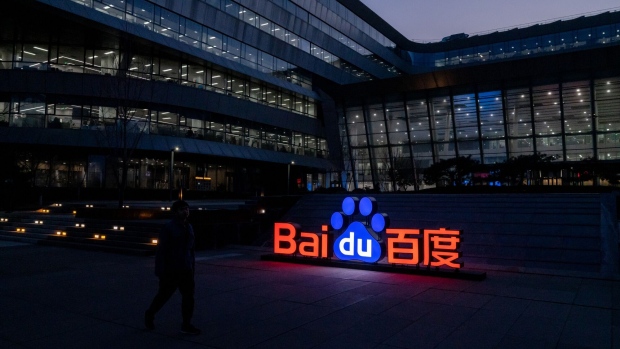Aug 30, 2023
Baidu Among First Firms to Win China Approval for AI Models
, Bloomberg News

(Bloomberg) -- China approved the first batch of generative artificial intelligence services for public rollout, freeing up homegrown technology champions including Baidu Inc. and SenseTime Group Inc. to openly compete with the likes of OpenAI Inc. and Microsoft Corp.
The Cyberspace Administration of China green-lit a handful of firms to move ahead in the field, including fledgling players and major technology names, people familiar with the matter said. Search leader Baidu and SenseTime were among the first to win approval from Beijing’s top internet watchdog. ByteDance Ltd. made its AI chatbot available to the public, but didn’t respond to requests for comment.
Baidu’s shares gained as much as 4.8% in Hong Kong. In a post on its official WeChat account, Baidu said Ernie Bot — its ChatGPT rival — will become available to the public on Aug. 31. The company will also release a batch of new applications for users to experience generative AI.
“This is a positive surprise to the Street and a key milestone to ERNIE Bot,” Jefferies analyst Thomas Chong wrote. “It can be further upgraded on user feedback and strengthens its competitive moat.”
SenseTime shares rose as much as 7.3% in Hong Kong trading. Three startups — Baichuan Intelligence, Zhipu AI and MiniMax — confirmed they had gained government approval.
The Chinese Academy of Sciences also won the government’s blessing for its TaiChu service, but hasn’t introduced it yet, according to a person familiar with the matter.
Read more: Chinese AI Stocks May Gain as Beijing Said Set to Approve Models
The approvals, coming just weeks after the government implemented sweeping new regulations governing AI, officially bring ChatGPT-style services to one billion or more internet users for the first time.
The move marks a milestone for China’s budding AI industry and its would-be leaders, which since the debut of OpenAI’s ChatGPT have plowed billions of dollars into developing services capable of competing with the likes of Microsoft and Alphabet Inc.’s Google.
Beijing deems AI both a business and political imperative given the transformative nature of the technology. Baidu has so far stolen much of the limelight by debuting Ernie Bot in March, but Alibaba Group Holding Ltd. and Tencent Holdings Ltd. have since joined a parade of startups in touting their own foundation models.
It’s not immediately clear which companies other will get appproval in the future. The CAC didn’t respond to a faxed request for comment.
Beijing has designated AI one of a dozen tech priorities and, after a two-year regulatory crackdown, the government is seeking private sector help to prop up a flagging economy. China, like Europe, quickly moved ahead with regulatory oversight of what may be the most promising — and controversial — technology of the last 30 years, while the US has no legislation under serious consideration even after industry leaders warned that AI poses a “risk of extinction.”
The Chinese rules that kicked in Aug. 15 required generative AI services to get clearance before they became available to domestic users, part of guardrails intended to control content while allowing players to flourish and compete with US rivals.
Read more: Alibaba Chief Warns of Constraints as China AI Training Ramps Up
Services with content that can potentially influence public perception are required to pass a security review and file their algorithms for record-keeping, the rules said. But such guidelines were part of a watered-down, finalized version of the regulations first unfurled in April, signaling Beijing’s endorsement of the industry.
In a post-earnings call in August, Baidu’s billionaire co-founder Robin Li said the company was working closely with regulators to push the proper use of generative AI.
It’s still too early to tell whether Chinese-made generative AI services could rise to the level of must-have apps like Tencent’s ubiquitous WeChat. And US sanctions have deprived Chinese tech firms of the best chips to train their AI models, which could widen gaps between services like Ernie and their western counterparts.
In June, Baidu claimed Ernie outperformed ChatGPT on several measures. But Tencent said this month its own model in development was already one of China’s best, while Alibaba is integrating a ChatGPT-like AI into its meeting and messaging apps. All of them are seeking to make AI an integral part of their cloud-computing platforms, as such enterprise offerings are subject to less government scrutiny.
--With assistance from Lynn Doan and Seth Fiegerman.
(Updates with ByteDance’s introduction from the second paragraph)
©2023 Bloomberg L.P.





